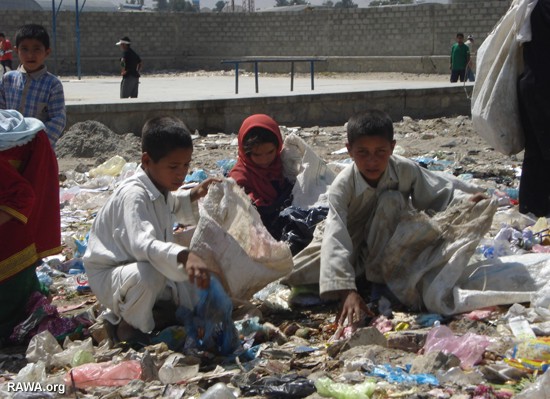KABUL - Hundreds of people have abandoned their homes and moved to urban areas in different parts of Afghanistan, and some have reportedly migrated to neighbouring Pakistan, due to worsening food insecurity, largely resulting from soaring food prices and low cereal supplies, provincial officials said.

Up to 18 million people in Afghanistan live on less than US$2 a day and are considered food-insecure, FAO says
At least 1,000 food-insecure people have left their homes in several parts of the northeastern province of Badakhshan over the past month, Nasir Hemat, the provincial head of the Afghan Red Crescent Society (ARCS), told IRIN.
“People have moved to other provinces and some have gone to neighbouring countries,” said Hemat, adding that in various parts of the province some people were eating grass due to lack of food.
Hundreds of locals have also been displaced in Alburz and other districts in the northern province of Balkh, local Kabul-based media said, quoting several residents and one provincial official.
Food-insecurity-related displacements have also been reported in southern Kandahar, Zabul and Helmand provinces where a “spreading armed conflict” has affected civilians and has impeded humanitarian and development access.
“We have received unverified reports that people have been displaced due to food-insecurity in Arghistan and Marof districts of Kandahar, and also in different parts of Helmand and Zabul provinces, and that some families have migrated to Quetta [in Pakistan],” Najibullah Barith, president of the ARCS in Kandahar Province, told IRIN from Kandahar.
Vulnerable
Prices of food - critically wheat flour - have increased by over 100 percent in Afghanistan over the past year, according to the Ministry of Agriculture, Irrigation and Livestock.
While millions of vulnerable Afghans have already been exposed to “high risk” food-insecurity, there are mounting concerns that price hikes could be compounded by drought and low cereal production in 2008. All this will adversely affect vulnerable communities.
"I get 3000 afghanis salary; 50kg flour sack is sold 3000 afghanis I can't buy other edible." Irfanullah an angry protestor complained.
“Below-average levels of rain and snow during the 2007-08 wet season, high food prices, and low regional cereal supplies are likely to lead to increased levels of food insecurity for small-scale farmers, rain-fed agriculturalists, pastoralists and poor households in urban areas,” said a report by Famine Early Warning Systems (FEWS) of the US Agency for International Development (USAID) released on 24 April.
Aid agencies have warned that vulnerable Afghan households may not be able to cope with worsening food-insecurity, and “additional shocks” will probably lead to mass displacement and starvation.
Immediate remedies
In an effort to control soaring food prices and mitigate their impact on destitute Afghans the government has earmarked US$50 million to buy and import food items from regional markets, a spokesman for President Hamid Karzai said in Kabul on 22 April.
Afghan food markets are affected by a strict ban imposed by the Pakistani government on wheat flour exports. Pakistani officials say their country is also affected by increasing global food prices.
Given Afghanistan’s weak coping and response capacity, millions of its food-insecure and highly vulnerable citizens are increasingly becoming a heavy burden for the UN World Food Programme (WFP), which already feeds over five million Afghans.
To alleviate the food-insecurity crisis aid agencies and the Afghan government should work on “well-targeted food assistance”, improve peoples’ purchasing power, exempt commercial food imports from tax, boost regional cooperation to mitigate the impact of high food prices, and tackle widespread food-insecurity, the authors of the FEWS report recommended.



